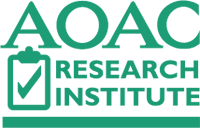AOAC INTERNATIONAL’s global science and professional support programs support analytical excellence by developing and validating standards and methods, certifying technical performance and proficiency, and providing training and capacity-building programs. Together, they create the environment essential for global confidence in the food supply.
AOAC’s core programs represent departments that serve as the foundation for all science activities and services provided by AOAC. Each is either nationally accredited or bears a registered service mark. Though each has distinct responsibilities and provides a unique service in support of AOAC’s mission, they all work in concert to reflect a harmonized quality system through analytical excellence.

AOAC’s Analytical Solutions Forum (ASF) brings global stakeholders together to identify emerging needs and technologies in scientific analysis of food and related products.

The Official Methods of AnalysisSM (OMA) program is AOAC’s premier program for developing food testing analytical science methods that are recognized and legally defensible worldwide.

AOAC’s Proficiency Testing (PT) helps labs compete in the global marketplace by demonstrating that they meet the highest international standards for accuracy, reliability, and compliance.

The Performance Tested Methods and other programs are provided by the AOAC Research Institute (AOAC RI), a division of AOAC that validates proprietary kit-based food safety testing methods.
This newly established working group is composed of four contaminant-specific subgroups to develop and adopt voluntary consensus standards for color additives from natural sources.
AOAC INTERNATIONAL is developing a new project on the analysis of ethylene oxide residues (ethylene oxide and 2-chloroethanol).
AOAC is seeking support to launch a working group to review the applicability of current standard method performance requirements for heavy metals in foods in response to the lower regulatory limits worldwide. The project is proposed to operate at an accelerated pace to meet a timeline specified by stakeholders.
This integrated project will provide analytical solutions for the detection and quantification of per- and polyfluoroalkyl substances (PFAS) in processed and packaged foods and raw agricultural commodities.
AOAC’s integrated science programs are provisional activities formed under a specified thematic scope to achieve deliverables that incorporate services and expertise from each core program. The degree of program integration will vary based on the scope and need defined for the program or project.

AOAC’s Analytical International Methods & Standards (AIMS) Program focuses on capability gaps in laboratory testing, emerging microbial threats to food safety, and developing standards for using cutting-edge technologies.

Botanical Ingredients and Dietary Supplement Integrity program (BIDSI) develops consensus-based standards for the determination of folic acid in a variety of dose forms, including chewable gels, soft gels, and tablets.

AOAC’s Cannabis Analytical Science Program (CASP) is a forum where the science of hemp and cannabis analysis are discussed and cannabis standards and methods are developed.

AOAC’s Gluten & Food Allergens (GFA) Program focuses on coordinating all future consensus-driven need for development, validation, and implementation of methods for the analysis of a wide range of food-associated allergens and gluten.

AOAC’s Stakeholder Program on Agent Detection Assays (SPADA) brings together expert stakeholders from the biothreat community to foster a comprehensive and uniform approach to scientific analysis and detection of biothreat agents.

AOAC’s Stakeholder Program on Infant Formula and Adult Nutritionals (SPIFAN) develops consensus-based standards and methods to make infant formula and adult nutritionals safer for babies and adults to consume.